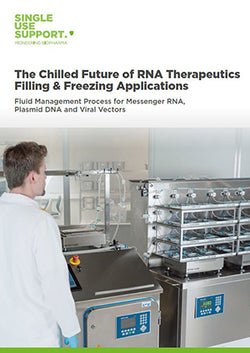Single-use technology in mRNA manufacturing
As the demand for mRNA vaccines and therapeutics increases, the biotech industry needs solutions that enhance scalability and productivity. Single-use technology has emerged as a game-changer in this regard, making mRNA manufacturing more efficient and adaptable to surges in demand. Single Use Support has been at the forefront of this innovation, providing unique solutions to alleviate mRNA manufacturing challenges.
Advantages of single-use technology in mRNA production
Single-use technology has revolutionized the biopharmaceutical industry, and mRNA production is no exception. With the ability to drastically reduce contamination risks, streamline workflows, and scale up rapidly, single-use systems bring several advantages and have enabled the mass production of life-saving mRNA vaccines and therapeutics.
It is the flexibility of single-use technology which is a major contributor to the process development. Production lines can be quickly set up, scaled, or repurposed to meet urgent demands, enhancing productivity and cutting down the time from development to deployment.1
Safe fluid management during mRNA manufacturing
MRNA products are sensitive formulations which require specific production modalities. This is not only because of low mRNA stability, but also due to special requirements of other sensitive components like LNPs that are used as mRNA delivery systems. The manufacturing process from plasmid DNA to mRNA formulation bears considerable risks of contamination, as well as product alterations. Fully automated and modular solutions by Single Use Support help to minimize human error during manufacturing and safeguard maximum product viability.
By using single-use bioprocess containers in combination with the aseptic filling and filtration system RoSS.FILL, fluid management does not only become safer, but easier to scale-up, depending on your project’s requirements and specifications.
Preserving the integrity of mRNA and deriving products also implies paying tribute to their high requirements in terms of temperature control. Especially for longer storage, ambient temperature is not suitable for mRNA products, which would quickly deteriorate.
Consequently, one of the biggest challenges when handling mRNA products is the continuous cold chain. To achieve this, we rely on plate-freezing, which in comparison to other freezing methods minimizes the risk for protein denaturation through even freezing at -80°C.
Nevertheless, control is key in the ultra-cold freezing process of mRNA. With adjustable cooling rates and single-use bioprocess containers that can withstand the physical stress of extremely low temperatures, Single Use Support’s cooling platform helps to optimize mRNA manufacturing and processing.
Following ultra-cold freezing processes, mRNA can be prepared either for further processing, storage, or transport.
[[download-1]]
Advanced cold chain solutions for mRNA manufacturing
Preserving the integrity of mRNA and deriving products also implies paying tribute to their high requirements in terms of temperature control. Especially for longer storage, ambient temperature is not suitable for mRNA products, which would quickly deteriorate.
Consequently, one of the biggest challenges when handling mRNA products is the continuous cold chain. To achieve this, we rely on plate-freezing, which in comparison to other freezing methods minimizes the risk for protein denaturation through even freezing at -80°C.
Nevertheless, control is key in the ultra-cold freezing process of mRNA. With adjustable cooling rates and single-use bioprocess containers that can withstand the physical stress of extremely low temperatures, Single Use Support’s freezing platform RoSS.pFTU helps to optimize mRNA manufacturing and processing.
Following ultra-cold freezing processes, mRNA can be prepared either for further processing, storage, or transport.

Storage and transport of mRNA products with single-use technologies
Achieving ultra-low temperatures is not enough to preserve mRNA products from deterioration: Maintaining these temperatures is just as essential when preparing the valuable goods for storage and transport.
Yet again, single-use technologies have proven to be a viable option to fulfill this task: Single Use Support’s ULT storage freezer RoSS.ULTF is ready to provide stable temperatures as low as -75 °C. With storage density as an additional focus to maximize scalability as well as efficiency, the storage freezer offers space even for large amounts of mRNA products, filled in single-use bioprocess containers and safely protected by RoSS® Shell.
This single-use bag protection brings additional safety to mRNA manufacturing, storing, and transport, the latter of which is further simplified by RoSS.SHIP – a cold chain shipping container able to keep drug substances at temperatures below -60 °C for at least six days. However, this is just one puzzle stone in the product portfolio of Single Use Support that has been established to optimize mRNA manufacturing based on single-use technologies.
References
- Enhancing mRNA vaccine production efficiency with Single Use Technologies, https://www.thechargepoint.com/news/mrna-vaccine-production-efficiency-single-use-technology/, Published 2022
FAQ
What is mRNA manufacturing?
+
What is mRNA manufacturing?
mRNA manufacturing involves the production of messenger RNA (mRNA) for use in vaccines and therapeutics. This revolutionary technology has shown immense promise in the biotechnology industry, particularly in vaccine development, where it has significantly shortened development times and improved scalability.
What are the steps involved in mRNA production?
+
What are the steps involved in mRNA production?
mRNA production steps include in vitro transcription, capping, synthesis of mRNA, and mRNA purification. The process is relatively simple, scalable, and fast, making it a promising approach for vaccine and therapeutic production.
What challenges exist in mRNA drug manufacturing?
+
What challenges exist in mRNA drug manufacturing?
Key challenges in mRNA drug production process include scaling up production to meet global demand, maintaining strict temperature control throughout the manufacturing process, ensuring aseptic conditions, and implementing rigorous quality control measures to ensure the final product's safety and efficacy.
How can single-use technology contribute to the production of mRNA?
+
How can single-use technology contribute to the production of mRNA?
Single-use technology enhances mRNA production by improving scalability and productivity. For instance, Single Use Support offers automated closed systems that optimize processes, protect drugs and biologics from temperature fluctuations, and fulfill cGMP regulations.

Download now
App Note: The Chilled Future of RNA Therapeutics Filling & Freezing Applications
This application note explores scalable, GMP-compatible solutions for the sterile filling and cryopreservation of mRNA, pDNA, and viral vectors. It presents modular technologies that ensure temperature control, minimize product loss, and support high-accuracy aliquotation - paving the way for efficient commercialization of RNA-based therapeutics.
